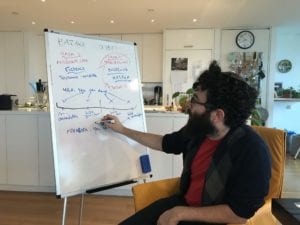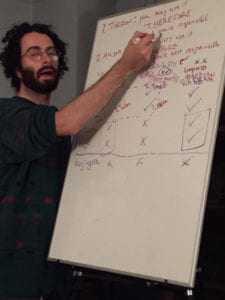Secular Talmud study
The Talmud, a central Jewish text, is one of the most absorbing and challenging religious reference books in the world. It has two components. The first part is the Mishnah, a written account of the oral Torah, recorded in the first two centuries of the common era. The second part is the Gemara, an analysis and commentary on the Mishnah, written during the third and fourth centuries of the common era.
The Talmud is the basis for Jewish law and was recorded from oral tradition with the initial intention of memorization. Gemara means, “to study and know,” as the Talmud teaches not only about the Jewish legal code but also discusses ethics, philosophy and customs.
Why do those practicing Humanistic Judaism study Talmud?
As Humanistic Jews, we value both reason and intellectual challenge.
Historically, Jewish scholars studied Talmud to extract legal guidance and establish community norms, especially as unprecedented situations arose requiring practical leadership and direction.
We study Talmud as a historical text. We enjoy the challenge of decoding, interpreting and discussing these esoteric teachings and discovering how they demonstrate practical relevance to our lives today.
Ultimately, we at The City Congregation recognize the value of participating in the ancient tradition of studying Talmud, which results in stimulating intellectual debates and a shot of whiskey to end our class.
Study Talmud from a cultural perspective.
The adjudication of interpersonal disputes provides context for understanding the ancient civilization, Jewish and gentile. It provides background that helps us understand the origins of man-made laws governing Jewish rituals which exist today, as well as providing guidelines for living meaningful lives. By studying Talmud, we develop the ability to dissect what it means to be Jewish today.
Guests are invited to try the class twice before joining TCC as members or friends.



